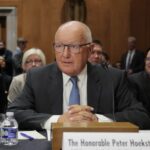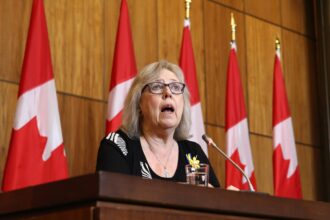The specter of Alberta separatism has resurfaced on American airwaves, igniting fresh controversy in Canadian political circles after Fox News aired a segment highlighting separation sentiment in the province. The timing is particularly noteworthy, coming just days after former Bank of Canada governor Mark Carney’s comments about Donald Trump’s potential impact on the Canadian economy sparked heated exchanges between Conservative and Liberal politicians.
Fox News host Jesse Watters devoted a portion of his prime-time show to discussing what he termed “Canada’s Texas” and its alleged desire to break away from the rest of Canada. “The province of Alberta is thinking about seceding from Canada,” Watters declared to his audience, suggesting that Albertans are “fed up with the woke politics” of Prime Minister Justin Trudeau’s government.
The segment featured carefully selected clips of Alberta Premier Danielle Smith discussing the province’s Sovereignty Act, though critics note these clips were presented without crucial context regarding the legislation’s actual scope and limitations. The Fox News portrayal painted a picture of widespread separatist sentiment that many policy experts argue significantly overrepresents the actual level of support for separation in the province.
Political scientist Duane Bratt from Mount Royal University in Calgary immediately challenged the accuracy of the Fox News coverage. “No, Alberta is not thinking about seceding from Canada,” Bratt stated firmly on social media, pointing out that even Premier Smith herself has explicitly rejected separatism as a viable or desirable option.
“This is exactly the type of American media coverage that damages our national unity,” said former MP Catherine McKenna in response to the segment. “It intentionally misrepresents provincial disagreements with federal policies as a full-blown separatist movement, which simply isn’t accurate.”
The timing of the Fox News segment has raised eyebrows, coming shortly after Mark Carney warned about potential economic consequences for Canada under a second Trump administration. Carney’s analysis that Trump’s policies could cost Canada “hundreds of thousands of jobs” triggered immediate pushback from Conservative Party leader Pierre Poilievre, who accused Carney of “fear-mongering.”
Premier Smith, who previously hosted a radio show before entering politics, has maintained a delicate position on Alberta’s relationship with Ottawa. While championing provincial autonomy through her government’s Sovereignty Act, she has repeatedly stressed that separation is not her objective. “I have always been clear that I believe Alberta’s future is strongest within Canada,” Smith stated at a recent press conference when asked about the Fox News coverage.
Political analysts suggest the American network’s interest in Alberta separatism reflects broader geopolitical narratives rather than Canadian political realities. “There’s a clear appetite in certain American media circles for stories that portray progressive governments facing internal resistance,” explains political communications expert Sandra Thompson from the University of Alberta. “The Alberta situation provides a convenient narrative that aligns with certain American political viewpoints.”
The portrayal of Alberta as Canada’s conservative heartland seeking independence resonates with particular American audiences, but polls consistently show that actual support for separation remains a minority position in the province. A recent Angus Reid survey indicated only 23 percent of Albertans would vote for independence in a hypothetical referendum, while 65 percent would vote against it.
As Canadian politics increasingly becomes fodder for international media commentary, the question remains: how should Canada respond when domestic political disagreements are amplified and distorted through the lens of foreign media outlets that may have their own political agendas? The Alberta separatism narrative may serve certain storytelling purposes abroad, but its relationship to political reality in Canada remains tenuous at best.











